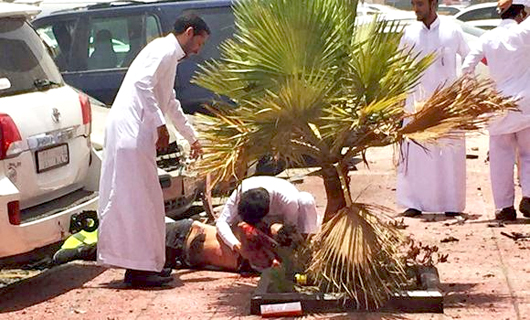Riyadh, May 30: In widespread condemnation across Saudi society, prominent citizens reacted strongly on Friday to yet another terror attack in which a suicide bomber blew himself up near a mosque in Damman leaving four people dead.
Governments and top officials from different countries have expressed their deep sorrow at the fresh suicide bombing that came exactly a week after a bomber killed 21 people and injured over 100 in a mosque in Qatif.
Reacting to the terror attack, Mohammed Alkhnessi, a member of the Shoura Council, said: "We really feel sorry for what happened today and last week exactly at the same time of prayer in the mosque; this is a deeply disturbing and destabilizing act of terror."
"The perpetrators of these terror attacks have only one agenda which is to disturb the peace, and I am sure they will never succeed as the government and security establishments are fully prepared to thwart and ready to follow up with the appropriate actions," he added.
He addd: "We have full faith in our security systems and administration to maintain peace and stability, and bring the perpetrators of such a heinous crime to book."
He maintained that IS, or the so-called Islamic State, once again took responsibility for the attack, which is disturbing, and it is time to stop the growing menace.
Sadaka Yehia Fadil, a senior member of the Shoura Council, told Arab News: "We are fighting terrorism and are part of an international coalition against the menace; in fact we are one of the most successful states fighting terrorism, dealing with all threats and very successfully thwarting any such attempt by extremists."
He added that the Ministry of Interior and security agencies are well prepared and handling the issues appropriately one after another.
He exuded confidence: "I am sure the perpetrators of the terror attack in Dammam will not be spared and the culprits will be arrested and punished sooner rather than later."
He underlined that there is need to identify patterns and apply pre-emptive tactics against such a ruthless act of terrorism aimed at disturbing the peace.
"We very strongly condemn the act of terror. Islam is a religion of peace and completely prohibits violence and extremism in the strongest words. Those involved in such activities are ill advised and wrongly informed on Islam. They cannot be Muslim — they are misled people with very wrong interpretations of Islam," he said.
Mohammad Al-Ameen Khatari, head of the Islamic Affairs Bureau in Madinah, also expressed deep anguish and sorrow over the killings in Dammam and expressed his deep sympathy and condolences to families of the victims of this heinous crime.
He said: "This terror attack is an attempt to continue the hate campaign by the perpetrators of terrorism and aims to destabilize this peaceful country by creating a sectarian divide. They will not succeed at all. We, the people, are with the state to ensure that.”
He added that all preachers at mosques across the Kingdom have strongly condemned the terrorist attack in the Eastern Province.
Saud M. Al-Suwaileh, who works with the Ministry of Finance as an economist and the former manager of the US-Saudi Business Council, told Arab News: "They are evil and simply trying to disturb peace by seeking attention; this is not going to happen and they will be punished."
He also blamed Iran for playing dirty games in the region by disturbing the peace.
"Our government is ready to thwart any such attempt," he said.
Affirming full faith in the security systems and the government, Zeyad Abdullah, a citizen, said the “state and its machinery is proactive to ensure safety and security. No matter who violates it, the culprits will be punished for sure. So let us all be one with the government to defeat terrorism.”
The Pakistan Ulema Council also condemned the terror act. Sheikh Tahir Mehmood Ashrafi, president of the council, said: "This is a plan from external regional elements to destabilize peaceful coexistence in the Kingdom."
The council also pledged support to Custodian of the Two Holy Mosques King Salman in the fight against terrorism.
The Kingdom of Bahrain denounced the Anoud Mosque terrorist attack, describing it as an act of cowards.
Notably, the government condemned the attacks as terrorism and Grand Mufti Sheikh Abdul Aziz Al-Asheikh called the terror attack a “criminal” act against the “sons of the homeland.”






Comments
Add new comment